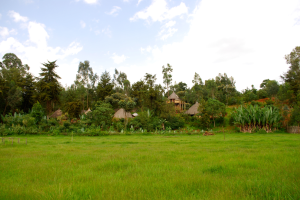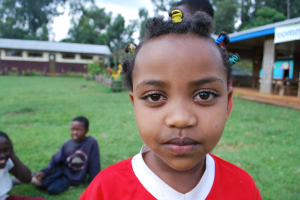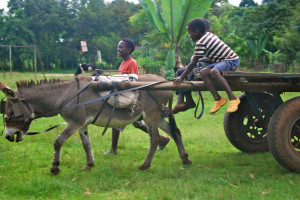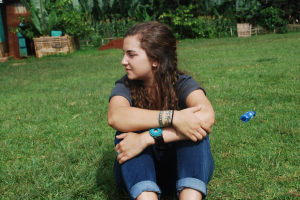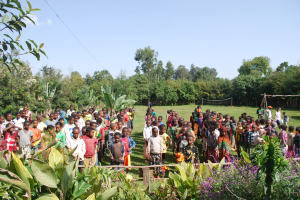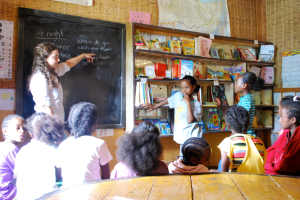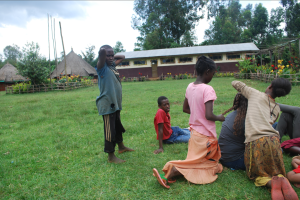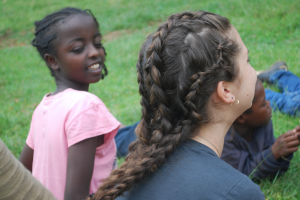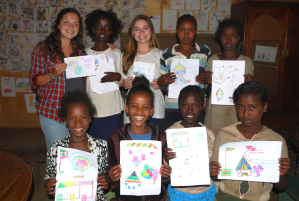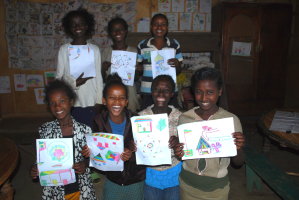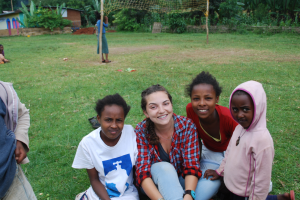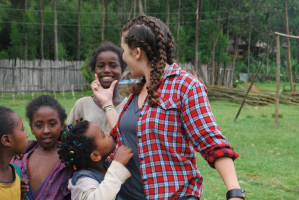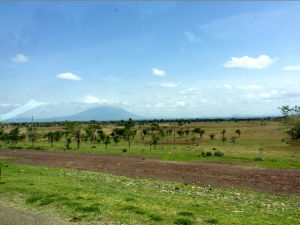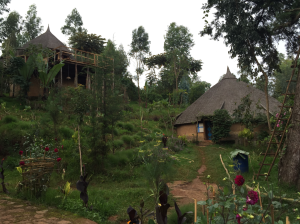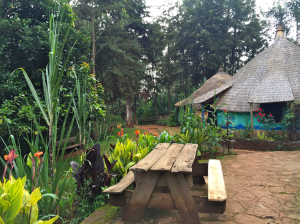Hello all! I’m sorry it’s taken me so long to post, I didn’t have good access to internet upon arrival, and then it was down for awhile. But here are all my updates!
Initial impressions:
Everyone here is so so kind and wonderful. The older women are extraordinarily maternal—they love hugging and kissing you, and have so much to say despite the extreme language barrier. They just talk at you in Sidamic (the tribal language) or Amharic (the national language) even though they know you have no idea what they’re saying. It’s really sweet actually; they really don’t care if you understand, they just want to tell you anyway. And all the kids are so excited and happy all the time, so they’re fun to be around.
It is insanely beautiful here—so lush and green and tropical. I would describe the terrain as rainforest-y grasslands. We all sleep in traditional huts that they have built themselves, which are super impressive. They are in the process of building a new one right now, so it’s been really cool to see how they do it. And the food is really good, very organic! Everything is either grown in our compound or bought in the village. Eating meat is rare, I’ve still yet to see it served. Lentils, potatoes, cabbage, avocados, and pineapple are some of the items I eat most often, along with injera, an Ethiopian staple.
The culture:
The town of Aleta Wondo, and specifically the more rural part of the village where we are, are both quite traditional and very patriarchal. It is not hard to see that the women are extremely oppressed. They have little to no autonomy, and are extremely emotionally repressed. They are generally silent when men are around, and yield to them in most all areas of life. This all largely holds true amongst the children as well. The men who work here at Common River seem to be a little more aware of this than others, presumably because Tsegaye (the local co-founder) has tried to teach them to respect the women.
Nonetheless, they are all extraordinarily kind and welcoming. They treat guests very well—Emily (the other volunteer here) and I even got our feet washed! They also love to bless us which is really sweet. It is usually initiated by a man named Tefese, who says a whole thing about us and then someone translates, and everyone sends us blessings with their hands. It’s really cool. And as I said, the women shower you with so much love. We have started spending time in the kitchen with them which is so much fun. They’ve been teaching us how to cook and letting us help prepare meals!
I went into the town one day to exchange money, which was a very interesting experience. There are absolutely no white people here, so everyone just stared at me. Some were really excited to see me—one woman came up to me with a huge grin on her face and gave me a big hug, which I thought was cute. Others would come up and shake my hand. And most of the kids loved smiling and waving, or would walk with us for a little. But others just stare and stare, and even appear somewhat threatening. I was with two guys from Common River so I was protected and (somewhat) comfortable, but people would say things I didn’t understand, and look at me in really unnerving ways. At one point, a homeless man saw me and instantly started furiously begging me for money and wouldn’t leave me alone. Overall it was a somewhat overwhelming and very interesting time.
What I’m doing:
When I arrived, there was a girl named Emily who had already been here a month, and is staying until early August. She is teaching English to some of the younger girls, and is also doing a female empowerment class, both of which I have started teaching with her. When she first arrived, she tried teaching English to boys and girls, but instantly requested to teach girls-only classes, because the boys are so overpowering and the girls are too timid and embarrassed to participate in class. Even when it was just them, they would hide their faces, avoid eye contact, and struggle to speak because they were so uncomfortable participating. This is why Emily decided to do female empowerment. This week we taught them about identity. Most of them have never been asked how they feel about anything, and have never done any self-reflection, so we worked on identifying things they like about themselves, what they are good at, and the many roles they fill in the community. Emily said it has been really really hard for them to share thoughts and opinions, again because no one has ever asked them to, but it has gotten dramatically better. At the end of this week, when asked what they liked about what they learned, a girl named Aynalum said that she felt like she discovered things inside her heart that she never knew existed, but had always been true. They finally started to understand that they all have their own unique identity, and that each of them is more than just a girl who helps her family. They began to identify themselves as being singers and poets and soccer players and storytellers, and shared that they wanted to be teachers and doctors when they were older. It was really amazing; I don’t think these were things that any of them had ever realized or put into words before. And the beautiful thing was that our interpreter, Worke, who is an Ethiopian woman as well, shared that this class was also helping her realize a lot more about herself, and teaching her to think about her thoughts and emotions instead of burying them. She said that there has always just been “one road” in her mind—she only thought in one way, but now she wanted to build many roads so that she could actually interpret and reflect upon what she was experiencing. It was all just really amazing.
We are now organizing a second class for slightly older girls, where we will address the same sort of empowerment topics, but also focus it around health, sanitation, and nutrition. Young marriage is a huge problem here. Some girls get married as early as 15 or 16, so they are thrown into adulthood quite abruptly. Emily is going to do the class with me for the next few weeks until she leaves, but then I will continue it over the course of my stay. I will talk to them about things like sexual health, healthy relationships, self-defense/street safety, and forming a safe and trusting support group. Women in this community don’t talk to anyone about their problems, and don’t even really allow themselves to think about them. If a girl is raped, she likely won’t tell a single person because she is so afraid of being thrown out or worse, because sex before marriage is so forbidden. It will be challenging to get to the point where the girls feel safe and comfortable enough to actually talk about some of these issues, but once it happens, I think this could be a really powerful experience for everyone, especially me.

